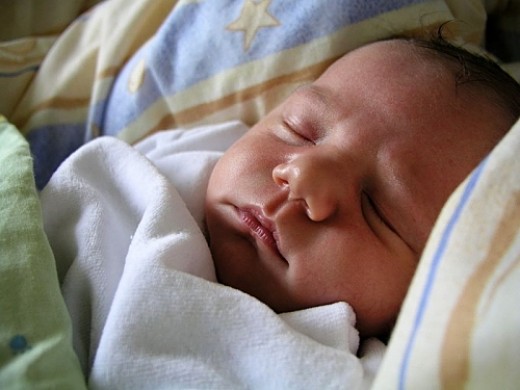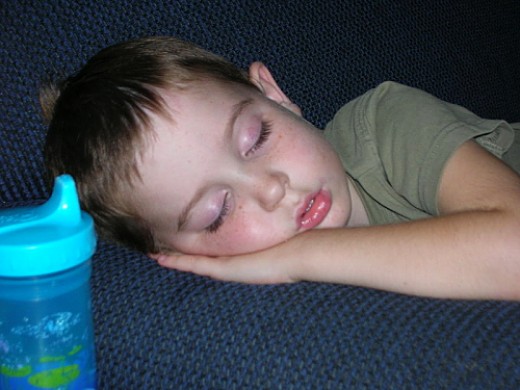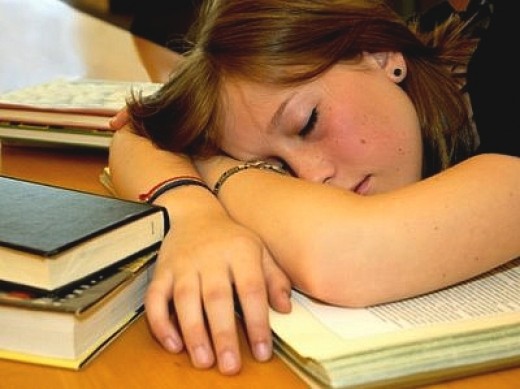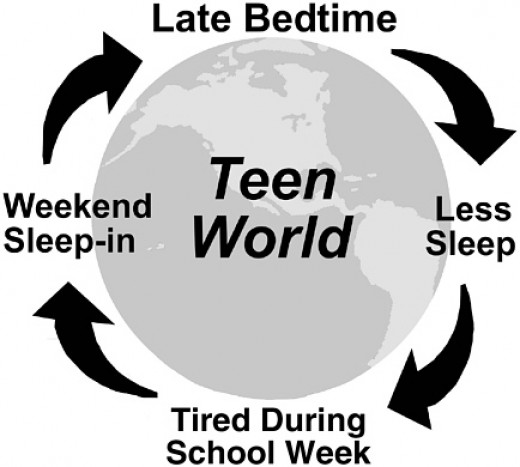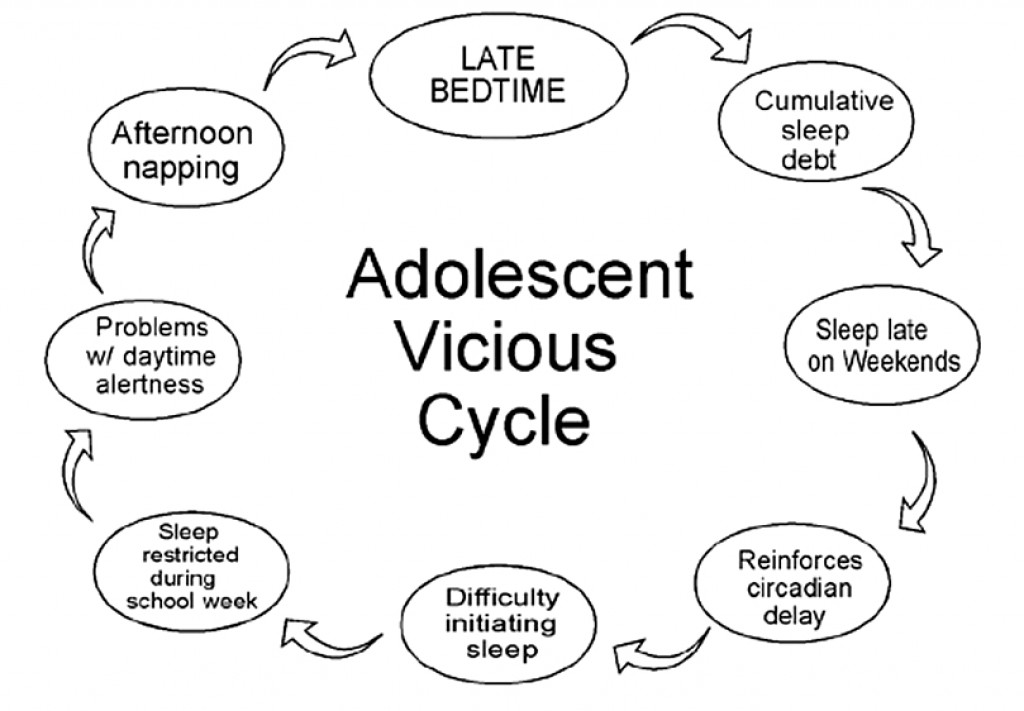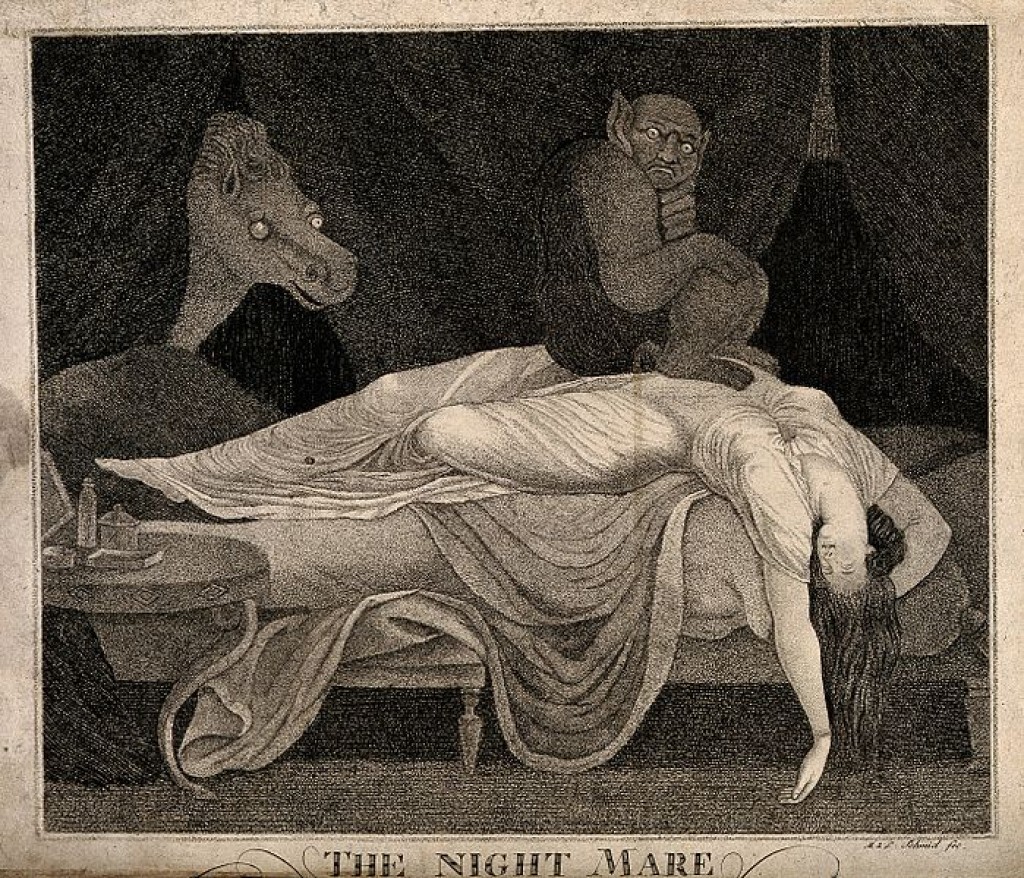How Much Sleep Do You Really Need - Age, Weekly Cycle and Personal Needs Guide
The famous mantra that everyone needs eight hours sleep a night has become a dream for some, and a nightmare for others. The reality is that different people have varying needs for sleep, have different sleep cycles and patterns.
The ideal average amount of sleep needed varies with age, but also varies considerably. Recent research has confirmed the individual variability. It has also shown that if you get behind in your normal sleep pattern, your body will try to catch up for the sleep you missed.
Research conducted in Sydney Australia confirmed that there is a weekly and fortnightly pattern of sleep. Many people get behind in their sleep needs on weekdays, and build up a sleep debt. They then need to repay the debt by sleeping more on weekends. It’s similar to a credit card, you can get behind using credit, but you have to pay the debt back eventually.
The research also showed that sleep requirements, patterns and the ability to make up for lost sleep varies between individuals.
► Some people need a lot less sleep and only take a couple of days to catch up.
► Others can take up to 18 days for their sleep patterns to return to normal and catch up on missed sleep.
► Understanding how the amount of sleep required varies with age, the weekly cycle of debt and repayment, and how individual sleep needs vary, are important for ensuring you get enough sleep.
► Not everyone needs 8 hours sleep every night.
This article reviews the latest research on sleep needs, cycles and patterns.
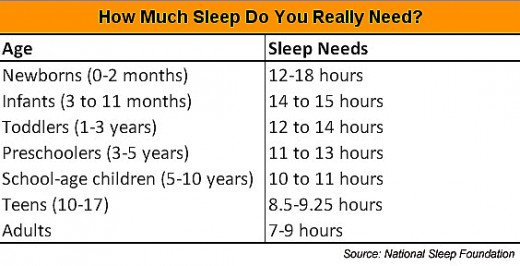
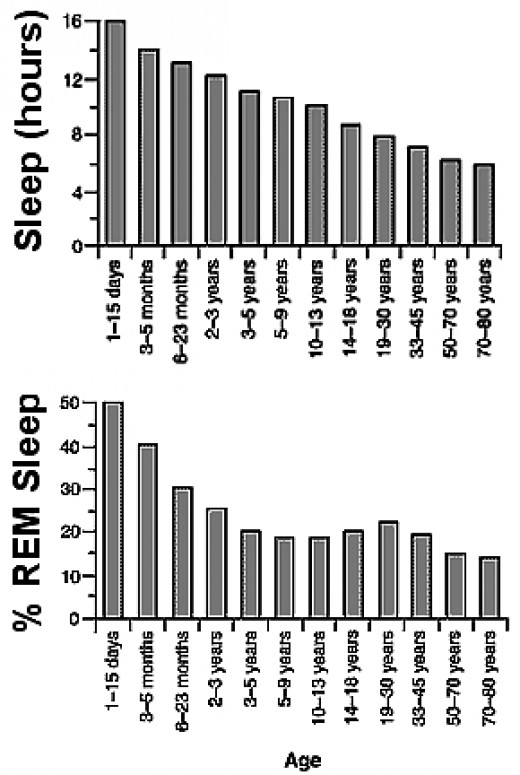
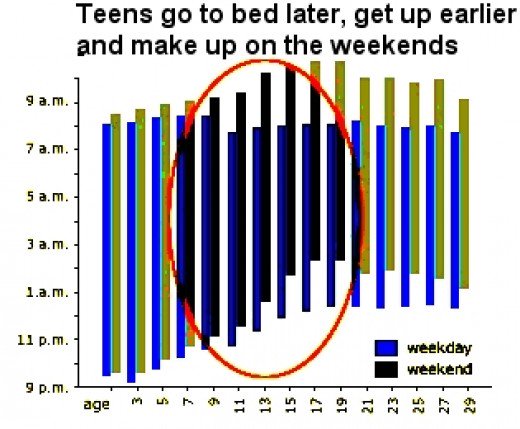
General Advice on Sleep Required for Various Age Groups
The standard data for average sleep requirements is shown in the table below. Each category has a range of values reflecting variation between individuals. It also shows how naps contribute to the overall amount of sleep for children under the age of five years. People older than 60 years also tend it have regular naps and require much less sleep at night than younger adults. Napping in teenagers and young adults is generally a sign that the person is not getting enough sleep at night. That said, it is remarkable how effective a short nap can be in refreshing the brain and overcoming tiredness.
Sleep Requirements at Night and during Naps
|
Age Group
|
Total Sleep
|
Sleep at Night (hours)
|
Sleep during the Day (hours)
|
|---|---|---|---|
|
Newborns (O - 2 months)
|
12 - 18 hours
|
6 - 9 hours
|
6 - 9 hours
|
|
Infants (2 - 12 months)
|
14 - 15 hours
|
9 -12 hours
|
2.5 - 5 hours
|
|
Toddlers (1 - 3 years)
|
12 - 15 hours
|
9.5-11.5 hours
|
1.5 - 3.5 hours
|
|
Preschool (3 - 5 years)
|
11 - 13 hours
|
Most sleep is at night
|
Daytime naps become rarer. A child (3 -5 years of age) tends to stop napping at this age.
|
|
School-Age (5 - 12 years)
|
9 - 11 hours
|
All sleep should be at night.
|
Naps at this age tend to be from not getting enough sleep at night.
|
|
Teenagers (13 - 19 years)
|
8.5 - 10 hours
|
All sleep should be at night.
|
Naps at this age tend to be from not getting enough sleep at night.
|
|
Adults (19+ years)
|
7 - 9 hours
|
All sleep should be at night.
|
Naps at this age tend to be from not getting enough sleep at night.
|
|
Adults > 60 Years
|
6 - 7 hours
|
Most sleep at night.
|
Regular naps are common for older people
|
Making Up for Lost Sleep
Unlike some previous research, that has suggested that busy people made up for lost sleep by sleeping in on the weekend, the Australian study showed that the sleep debt could be repaid over a much longer period of time, by adding blocks of one to two extra hours. Sleep patterns and recovery varied widely between individuals. It appeared that there were as wide range of individual cycles that was built into each person, rather than being a behaviour pattern.
Fourteen subjects were fitted with sleep monitoring devices over a 14 day period. Their Total Sleep Time (TST including naps) was measured by the devices for each 24 hour period. The figure below shows the wide variation in individual cycles. Various people needed different amounts of sleep and their debt and recovery patterns were different. Most period would be unaware of their individual inherent cycle and sleep patterns. In view of this, general advice about trying to sleep eight hours a day may not be very helpful.
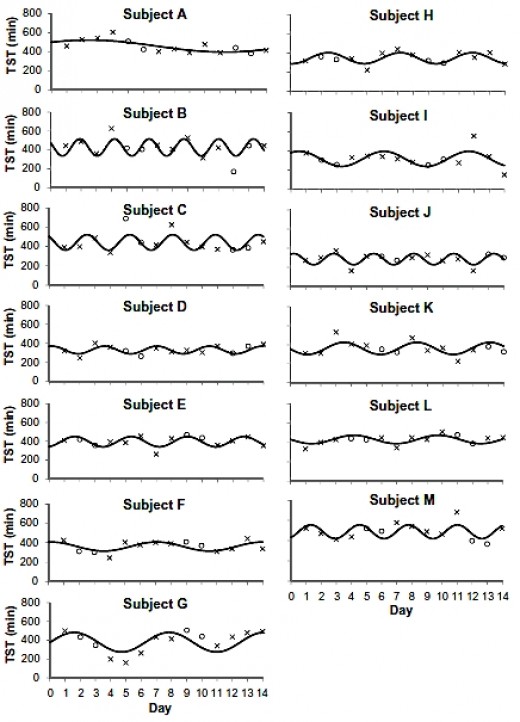
Teenage Sleep Problems
As shown in the table above, teenagers generally need more sleep than adults, generally an extra hour or so. But many teenagers stay up very late at night and end up deprived of sleep when they are awaken each day to get to school, college or their jobs.
Typically many teenagers , for a variety of reasons linked with caffeinated drinks and the stimulant effect of computer games, videos and social engagement, do not readily fall asleep before 11 p.m. or later. However many of them have to get up at 6 a.m. or earlier for their work or studies. Teenagers not working or going to school or college can end up becoming fully nocturnal, awake all night and sleeping most of the day. Sleep deprivation is such a widespread problem that many schools and colleges have shifted their start time back by an hour. Lack of sleep is a major issue for teenagers and young adults.
Research has shown that up to 90% of teenagers sleep less than 9 hours a night, and 10% average less than six hours. This leaves many teenagers vulnerable to the many problems associated with sleep deprivation. Tests have shown that many teenagers are pathologically sleepy when school starts and this has been shown to affect their performance.
After five weeknights of sleep deprivation, many teenagers and adults try to sleep-in after noon on weekends to catch up. While this works, to some extent, it can make them harder to arouse on Monday mornings. Parents need to be aware of the sleep debt that accumulates during the week and to allow them to sleep extra hours on the weekend. it is important to try to understand their long term cycle and adapt to it.
Concerned parents should also start keeping sleep diaries for their children. This will enable them to look for discrepancies between their sleep needs and the actual amount of sleep they over a week or a fortnight. However, parents should try to exert some controls by setting an appropriate bedtime and exert control over caffeinated drinks, so that they are not consumed after 5 PM.
Parents should also encourage their teenagers should avoid stimulating activities in the evening and bright lights (easy to say, but hard to do). Similarly getting light exposure in the morning can help to reset the biological clock, that can get out of sync with irregular sleep patterns.
What are the Symptoms of Sleep Deprivation
- Fall asleep within five minutes of going to bed
- Feel the need to sleep in for long sessions on weekends
- Fall asleep while watching TV or when relaxing in the evening
- Have to take naps to get through the day
- Get drowsy after heavy meals or when driving
- Get sleepy in classes, meetings, lectures, movies or warm rooms
- Feel sluggish early in the morning and late in the afternoon
- Always struggle to get out of bed in the morning
- Rely too much on the snooze button
- Need an alarm clock in order to wake up on time
What are the Consequences of Chronic Lack of Sleep and Sleep Deprivation?
Research has shown that inadequate sleep over long periods of time has a wide range of negative impacts, physical and mental that go much further than drowsiness through the day. It can cause serious mood swings and depression. Lack of enough sleep affects coordination, concentration, ability to engage in activities, judgment and reaction times. It can also seriously affect social interaction.
Some of the effects include:
- Increased risk of heart disease, diabetes and many other health problems
- Difficulty making decisions
- Impaired motor skills, concentration, focus and increased risk of accidents
- Weight gain and tendency to eat a very poor diet
- Concentration and memory problems
- Reduced ability to resist colds, flu and other infections
- Inability to cope with stress and minor things that go wrong
- Reduced creativity, engagement with difficult tasks and problem-solving ability
- Moodiness, 'snappy reactions' and irritability
- Fatigue, lethargy, laziness and lack of motivation
Can You Pay off Your sleep Debt? Will this prevent the impact of Sleep Deprivation?
Sleep debt is the difference between the amount of sleep you actually get and what you really need. Every time you scrimp on sleep, you add to the debt (like a credit card bill). Eventually, the debt will have to be repaid; you have to sleep to pay it off. If you lose an hour of sleep, you need an extra hour sometime later in order to get you sleep time balanced again.
Is Sleeping in, on weekends Enough!
Many people try to repay their sleep debt by having extra sleep on Saturdays and Sundays, but this is only partially successful as the five days of inadequate sleep accumulates. One or two good night's of sleep on the weekend will not pay off a long-term debt and won't overcome the damage that has already been sustained. While the extra sleep does help, people often feel tired and washed out, even after long sleeps in. Short naps during the week are also very helpful, but will not fully overcome the problem.
Tips for Managing Sleep Debt
Below are several tips for living with a sleep debt and managing its impact:
- Aim for at least 6 - 7 hours of quality sleep every night. Consistency is the key to making this work, and have short naps during the day when you feel very tired.
- Pay back any short-term sleep debt that accumulates with an extra 1-2 hours of extra sleep per night, 3-4 times a week. Try to avoid the debt accumulating to the weekend.
- Get a sleep diary and record your total hours of sleep, including naps, and your mood and feeling during the day. There are many great wrist devices that can do this for you. This will help you monitor your sleep and also help you to understand your sleep cycles and pattern over a 7-14 day period.
- Organise a 'sleep vacation' by using a week of regular 8 hours sleep to repair the damage and get back to normality. This can be during a vacation or other times.
- Make sleep a priority and stop ignoring your need for adequate sleep. You schedule time for work commitments and socialising, and it's time to put sleep back on the agenda. You can do this by adopting the following tips:
- Exercise regularly during the day, but don't exercise during the 2-3 hours before bedtime
- Don't eat for at least 2-3 hours before going to bed and don't drink caffeinated drinks four hours before going to bed.
- Avoid watching TV, using a computer, or reading in bed
- Create an environment that is conducive to sleep, with darkened, quiet room, a comfortable mattress and pillows
- Create a regular routine of relaxing and wind-down before bedtime. This may include soaking in a hot bath, listening to some soothing music, reading a boring book. This has to be scheduled an hour or more before bedtime.
- Establish consistent sleep and wake schedules and patterns, including during the weekends.
